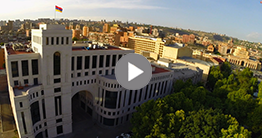Frequently Asked Questions
1. Who can apply to the Diplomatic School of Armenia?
Citizens of the Republic of Armenia under 35, who have a good command of the languages of instruction (Armenian and English) and of a second foreign language of their choice, and have a university degree, are eligible to apply. The university degree needs to be in one in the fields of specialization that is on “The List of University Specialities and Qualifications in the Republic of Armenia” approved by RA Government Decision #1191 of October 23, 2014.
2. What are the languages of instruction of the School?
Languages of instruction are Armenian and English.
3. Does one have to present a proof of English language (TOEFL, IELTS ) or does one sit special exams?
An examination board is set up each year to test each applicant’s knowledge in issues, related to foreign affairs as well as the applicant’s proficiency in foreign languages. There are two written stages and an oral one. All written works, submitted in Armenian, English and the second foreign language (all the three for each applicant) are double marked.
4. Is education free or does one have to pay a tuition fee?
The programs are free of charge and no fees are paid throughout the academic period.
5. What documents are necessary?
- An online application;
- A biography;
- A personal statement;
- A copy of the a diploma of higher education;
- Two passport-size photos (3,5 x 4,5 cm);
- A copy of the applicant’s passport and social security card or ID;
- Other documents, that are mentioned by the applicant.
6. Can one apply to the Diplomatic School if he/she is still studying at an undergraduate level?
Only students who already have a BA in the respective fields can apply to the School.
7. What exams does one have to take?
- A test of general knowledge and translations from Armenian into English and the second foreign language of the applicant's choice;
- An essay on International Relations and/or Foreign Policy of RA;
- An oral exam on topics of foreign policy.
8. Where is the School located?
The address of the Diplomatic School is:
Government Building 2, Vazgen Sargsyan 3, Yerevan.
Contact telephones: 00374 60 620 221.
Email address: contact@diplomaticacademy.am
9. When is the time to apply?
The school will announce exact days of admission each May and administer exams in June and July.
10. Can one apply to the School, if he/she is a Diaspora Armenian and does not have RA citizenship?
We are sorry, but currently only citizens of the Republic of Armenia can apply.
11. What is the length of the program?
The program starts in September and ends at the end of July next year.
12. What are the courses, taught at the School?
For its yearly program of “International Relations and Diplomacy” the Diplomatic School of Armenia offers the following courses:
International Relations, International Law, International Political Economy, Conflict Management and Resolution, Security Studies, European Processes, Instititions and Policies, EU Foreign Policy, Energy Politics, International Organizations, Foreign Policy Analysis, Armenia and International Organizations, Armenia and European Intstitutions, Armenia’s Relations with Neighbours, The Nagorno-Karabakh Conflict, Diplomacy, International Negotiations and Simulation Exercises, Political Analysis and Diplomatic Correspondence, Diplomatic Ethics and Protocol, Consular Diplomacy, Science Diplomacy, Public Diplomacy and language trainings tailored for diplomats.
13. Does the School provide a degree course?
The School does not provide a diploma; students get a Certificate of Graduation if they successfully complete the program.
14. When and where are the classes held?
The classes are held in the second half of the day, Monday-Friday, at the premises of the School.
15. What are the benefits of studying at the School?
The Ministry of Foreign Affairs will recruit diplomatic staff mainly from the Diplomatic School of the Republic of Armenia. Apart from some specialized jobs requiring experience, the Diplomatic School is the gateway to the diplomatic service of Armenia.
16. Can one work and study at the same time?
The School imposes no restrictions on the students, as far as they attend the classes and sit the exams. Moreover, the classes are scheduled in a way that allows the students, who do a degree course elsewhere or have jobs, combine their other activities with their study at the Diplomatic School.
17. Do the students have a chance of an internship at the Ministry?
The curriculum provides for internship at two different Departments of the Ministry of Foreign Affairs. The internship is obligatory for the completion of the program and lasts two months.






